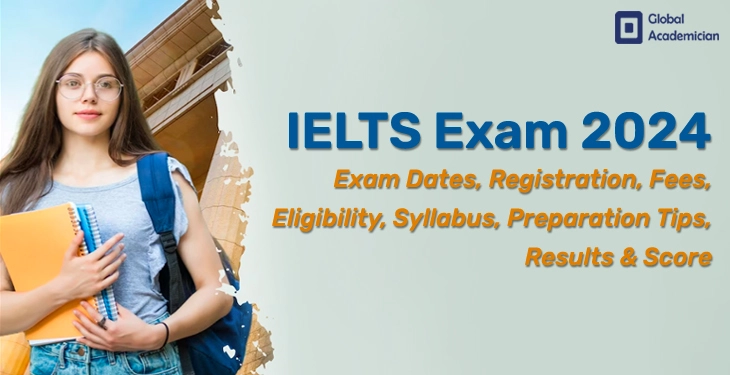
Are you aiming to ace your IELTS exam in 2024 and unlock exciting opportunities? Whether you’re seeking admission into a prestigious university, pursuing a professional career abroad, or simply aspiring to improve your English communication skills, conquering the IELTS is crucial.
IELTS Exam 2024:
The International English Language Testing System (IELTS) assesses your proficiency in English across four key areas: Listening, Reading, Writing, and Speaking. Two test formats are available:
- Academic Test: Designed for individuals seeking admission to higher education programs.
- General Training Test: Suitable for those seeking work experience, immigration, or training in English-speaking environments.
This comprehensive guide provides you with all the necessary information and resources to navigate the exam with confidence and achieve your desired score.
- Test duration: Approximately 2 hours and 45 minutes.
- Scoring: Each section is scored on a band scale of 1 to 9, with 9 being the highest score.
- Registration: Online registration is available through the British Council or IDP Education website.
- Test/Exam dates: IELTS is offered multiple times throughout the year. You can find the latest test dates on the official IELTS website.
Understanding the Exam Format:
Each section of the IELTS exam tests specific skills and requires unique preparation strategies. Here’s a brief overview:
- Listening: You’ll listen to various recordings and answer questions testing your comprehension of spoken English.
- Reading: You’ll read various passages and respond to questions testing your reading comprehension, vocabulary, and grammatical understanding.
- Writing: You’ll write two essays demonstrating your ability to express ideas clearly, concisely, and grammatically correct.
- Speaking: You’ll engage in a face-to-face conversation with an examiner, discussing various topics and demonstrating your fluency and pronunciation.
Here’s a breakdown of the specific details for each format:
Academic:
- Listening: Focuses on academic topics and lectures.
- Reading: Focuses on complex academic passages.
- Writing: Task 1 requires summarizing information from a graph, chart, or diagram. Task 2 requires writing an essay on a general topic.
- Speaking: Discusses academic topics and personal experiences related to education.
General Training:
- Listening: Focuses on everyday situations and social interactions.
- Reading: Focuses on general factual topics and practical information.
- Writing: Task 1 requires writing a letter requesting information or explaining a situation. Task 2 requires writing an essay on a general topic.
- Speaking: Discusses personal experiences and interests, and completes tasks related to everyday situations.
Eligibility Criteria:
While specific requirements might vary slightly depending on the testing location, the general eligibility criteria for IELTS are as follows:
- Age: There is no minimum age requirement for taking the IELTS test. However, most institutions considering IELTS scores prefer applicants to be at least 16 years old.
- Education: No specific educational qualifications are required to take the IELTS test. However, it is recommended that you have a good grasp of English before attempting the test, particularly for higher band score goals.
- Nationality: There are no nationality restrictions on taking the IELTS test. Individuals from any country are eligible to register and participate.
- English Language Proficiency: While fluency in English is not a requirement, it is helpful to have a basic understanding of the language before taking the test. This will aid in your comprehension and test performance.
- Valid Passport: A valid passport is required for registration and identification purposes on the test day.
Registration Fees:
The IELTS registration fee varies depending on your location and the testing format you choose. Here’s a breakdown of the current fees for different regions:
| Region | Academic Test Fee | General Training Test Fee |
| Australia | AUD 340 | AUD 340 |
| Canada | CAD 350 | CAD 350 |
| China | CNY 2,020 | CNY 1,960 |
| Europe | EUR 220 | EUR 220 |
| Hong Kong | HKD 2,300 | HKD 2,150 |
| India | INR 16,250 | INR 15,350 |
| Japan | JPY 26,000 | JPY 24,300 |
| New Zealand | NZD 375 | NZD 375 |
| Singapore | SGD 380 | SGD 360 |
| UK | GBP 205 | GBP 195 |
| USA | USD 275 | USD 275 |
How to choose the Right IELTS Reference Books:
Succeeding in the IELTS exam requires dedication, hard work, and the right resources. Choosing the right reference books can significantly enhance your preparation and boost your confidence. Here’s a detailed guide to help you select the best IELTS reference books:
1. Identify Your Needs:
- Your current English proficiency: Assess your strengths and weaknesses in each IELTS section (Listening, Reading, Writing, and Speaking). Choose books that address your specific needs.
- Your target score: Are you aiming for a 7, 8, or 9? Different books cater to different score ranges.
- Your preferred learning style: Do you prefer visual aids, interactive exercises, or comprehensive explanations? Select books that align with your learning style.
2. Types of IELTS Reference Books:
- General Guides: These books offer a comprehensive overview of the IELTS test format, question types, and scoring criteria. They often include practice tests and tips for each section.
- Skill-Specific Books: These books focus on a specific section of the IELTS exam, such as Listening, Reading, Writing, or Speaking. They provide in-depth explanations of the tasks, question formats, and strategies for success.
- Vocabulary and Grammar Books: These books help you improve your vocabulary and grammar skills, which are crucial for all sections of the IELTS exam.
- Practice Test Books: These books contain full-length IELTS practice tests with answer keys and explanations. They allow you to test your skills and identify areas for improvement.
3. Popular IELTS Reference Books:
- The Official Cambridge Guide to IELTS: A comprehensive guide endorsed by the creators of the IELTS exam.
- Barron’s IELTS Superpack: Includes all the necessary Barron’s IELTS materials in one convenient package.
- Collins English for the IELTS: Offers a step-by-step approach to improve your English language skills for the IELTS exam.
- IELTS Practice Tests Plus: Provides eight full-length practice tests with answer keys and explanations.
- Improve Your Skills for the IELTS Writing Test: Helps you develop your writing skills specifically for the IELTS exam.
- English Vocabulary in Use Advanced: Enhances your vocabulary with clear explanations and practice exercises.
- Murphy’s English Grammar in Use: A classic grammar book that provides clear explanations and practice for various grammar structures.
Preparing for Success in IELTS Exam 2024:
Effective preparation is key to maximizing your IELTS score. Here are some actionable tips:
- Set realistic goals: Assess your current level and determine your desired score, setting a realistic timeline for achievement.
- Familiarize yourself with the format: Understand the structure of each section and the types of questions to expect.
- Practice regularly: Utilize official practice materials, sample tests, and online resources to hone your skills.
- Develop your vocabulary: Actively learn new words and practice using them effectively in context.
- Focus on grammar: Master essential grammar rules and avoid common errors in your writing and speaking.
- Seek feedback: Get feedback on your practice writing and speaking from qualified instructors or peers.
- Manage your time effectively: Practice answering questions within the allocated time constraints.
- Stay calm and focused: Maintain a positive attitude and approach the exam with confidence.
IELTS Without Coaching: Essential Tips for Success
While many believe that coaching is essential for achieving a high score on the IELTS, it’s certainly possible to reach your target band score through independent preparation. Here are some crucial tips to help you navigate the IELTS journey without a coach:
1. Familiarize Yourself with the Test:
- Understand the format: Thoroughly research the structure of each section (Listening, Reading, Writing, and Speaking), including the question types and time constraints.
- Study the scoring criteria: Familiarize yourself with the band descriptors for each section to understand what examiners look for in your responses.
- Utilize official resources: Download the official IELTS test guide and practice materials from the British Council or IDP websites.
2. Develop Strong English Skills:
- Read extensively: Choose diverse reading materials, including newspapers, magazines, and academic articles, to improve your vocabulary and comprehension skills.
- Focus on grammar: Practice common grammar structures and identify your weaknesses through grammar exercises and online resources.
- Strengthen your vocabulary: Engage in vocabulary building activities, such as using flashcards, apps, and context clues while reading.
- Listen actively: Immerse yourself in English through audiobooks, podcasts, movies, and TV shows to improve your listening comprehension.
- Practice speaking: Find conversation partners online or join language exchange programs to build confidence and fluency.
3. Utilize Effective Learning Strategies:
- Set realistic goals: Divide your preparation into manageable chunks and set achievable goals for each section based on your target score.
- Create a study schedule: Allocate specific time slots for each section and stick to your schedule as much as possible.
- Practice regularly: Utilize practice tests and sample questions to familiarize yourself with the format and assess your progress.
- Analyze your performance: Review your practice tests and identify areas for improvement. Focus on addressing your weaknesses and refining your strengths.
- Time management: Practice managing time effectively during practice tests to ensure you complete all sections within the stipulated time frame.
4. Seek Additional Resources:
- Invest in reference books: Choose reputable IELTS reference books that offer comprehensive explanations, practice tests, and tips for each section.
- Utilize online resources: Explore websites and apps that offer free practice tests, vocabulary building exercises, and online communities for peer support.
- Join IELTS forums and communities: Connect with other IELTS test-takers online to share tips, ask questions, and receive encouragement.
5. Maintain Motivation and Focus:
- Stay optimistic: Believe in your ability to succeed. Focus on your progress and celebrate your achievements, no matter how small.
- Stay calm and focused: Manage stress effectively and approach the test with a positive mindset.
- Seek support: Talk to friends, family, or mentors for encouragement and motivation throughout your preparation journey.
6. Do not forget to:
- Self-directed learning requires discipline and commitment. Be dedicated to your preparation and put in the hard work required for success.
- Be patient: Improvement takes time. Don’t get discouraged by setbacks; keep practicing and focus on progress.
- Believe in yourself: Trust your abilities and approach the exam with confidence.
By following these tips and dedicating yourself to consistent preparation, you can achieve your desired IELTS score without the need for coaching. Remember, the key to success lies in your own effort, determination, and a positive attitude.
Countries accepting IELTS Score:
English-speaking countries:
- Australia: All universities and many professional bodies accept IELTS for academic and professional purposes.
- Canada: Required for immigration and considered by many universities and colleges.
- New Zealand: Mandatory for immigration and accepted by all universities.
- UK: Universally accepted for academic and professional purposes.
- USA: Accepted by many universities and colleges, particularly for graduate programs.
Europe:
- Austria: Accepted for university admissions and some professional licenses.
- France: Required for some university programs and professional licenses.
- Germany: Accepted by many universities and for some professional purposes.
- Italy: Accepted by some universities and required for certain professional licenses.
- Spain: Accepted by some universities and for certain professional purposes.
Asia:
- China: Accepted by many universities and required for some professional licenses.
- Hong Kong: Required for university admissions and some professional licenses.
- India: Widely accepted for study abroad programs and immigration.
- Japan: Accepted by some universities and for certain professional licenses.
- Singapore: Required for university admissions and some professional licenses.
Other regions:
- South Africa: Accepted by all universities and for some professional licenses.
- Latin America: Accepted by many universities, particularly for graduate programs.
- Middle East: Acceptance varies depending on the country and institution.
Resources which helps you for IELTS Exam 2024:
- Official IELTS website: https://ielts.britishcouncil.org/
- IELTS preparation materials: https://www.cambridgeenglish.org/exams-and-tests/ielts/preparation/
- Online practice tests: https://ieltsmaterial.com/official-ielts-practice-materials-vol-1-ebook-cd/
- IELTS blogs and forums: https://www.ielts-blog.com/
Remember, the IELTS journey is a continuous learning process. Embrace the challenges, celebrate your progress, and stay motivated throughout your preparation. By dedicating focused effort and utilizing the right resources, you can take control of your IELTs success and unlock a world of possibilities in 2024.
To stay ahead and stay informed about the latest educational updates, trends, and insights, we invite you to subscribe to our newsletter and regularly explore our blog. You can also connect with us on our Facebook Page to join our educational community at Global Academician. Join us on these platforms and embark on a journey of continuous learning and knowledge sharing.




